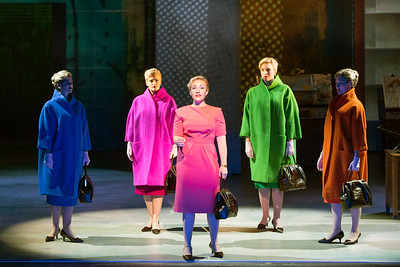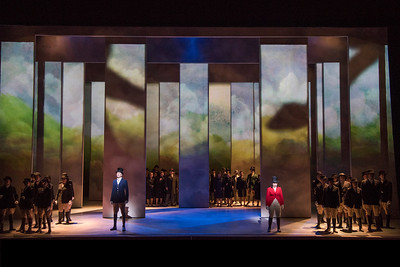London Coliseum , 18 November 2017
The world premiere of Nico Muhly’s Marnie should have been a great success. Everything was in its favour. The casting was strong, the composer is one of the foremost of his generation and greatly admired, the designs and costumes were strikingly impressive – in fact everything, on a superficial level, seemed fine. The real problem was with the adaptation of Winston Graham’s novel and the persona of the heroine herself.
The programme notes implied that Marnie has an enigmatic quality; that she is a sister to Melisande or Lulu. However, both of these – and many more – are strongly characterised to the point where we are swept away by their impact, even if at the end of the evening we know no more of them than we did at the outset. Marnie remains an enigma, but one who rouses little interest or sympathy. No matter how much new information about her comes to us as the evening unfolds, we are never drawn to empathise with her, even in the attempted rape scene at the end of the first half. She remains an outsider but one whom we can all too easily ignore.
The large cast create a highly credible world within which the narrative unfolds. The chorus are particularly important here and the sense of London in the late 1950s is extremely impressive. Arianne Phillips’ costumes are spot on – the four shadow Marnies gloriously apt – and the shifting visual world moves effortlessly between venues and between the real and illusory. All of this is excellently done. Michael Mayer’s direction within this is naturalistic for most of the intimate scenes but allows the choreography to open out the points of reflection. Here Marnie’s moments of self-reflection should be keys to the work as a whole but they hardly ever move beyond the banal.
Sasha Cooke looks splendid as Marnie and sings with finesse, though there are occasions when the text gets lost. The three older women – Kathleen Wilson as Marnie’s mother, Diana Montague as Lucy and Lesley Garrett as Mrs Rutland – were classic exemplars of singing actors who convey the whole text with ease as well as producing fine vocal sound and incisive characterisation.
Daniel Okulitch looked suave enough as Mark but occasionally lacked impact – a fault which may ease as the run progresses. The operatic version makes more of Terry than either of the sources and was sympathetically louche in James Laing’s hands.
Martyn Brabbins brought a great deal of detail to light from his large orchestra and his handling of the narrative was always well focused.
The first night was ecstatically received and the production moves to the Met next year where it is sure to be equally popular. As the excellent choral passages and much of the orchestration suggested, Nico Muhly is a natural opera composer. Hopefully he will soon find a subject which grasps the attention of the audience as well as his fine abstract qualities as a composer.


